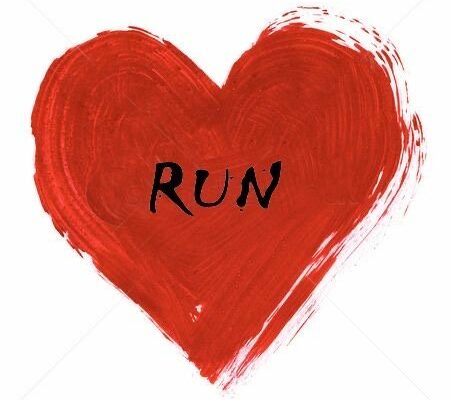Sufficient recovery time between your workouts is just as important as the training itself. When running three times per week you’ll be able to find the ideal energy balance between physical exercise and rest to recover.
 Why do you run?
Why do you run?
Your training schedule will be different according to your reasons for running. Are you after a specific running target, like a PR at 10K, or are you building up endurance to be able to run a marathon? Or do you run to clear your head after a busy day, stay fit and healthy, and feel more energized?
 Variation for Better Performance
Variation for Better Performance
To improve your running performance it’s crucial to vary different training intensities. To see progress, your body needs stimuli and by varying, you create those stimuli. You can run a longer or shorter distance. Slow or more intensively. Varying can be done in many ways. Ideally, you schedule runs at race tempo, duration runs at an easy pace, and high impact intervals. Additionally, you could do flexibility and strengthening exercises. These are crucial to your training schedule. Not only to become a better runner but also to prevent injuries.
 Easy Running to Release Stress and More Energy
Easy Running to Release Stress and More Energy
If you mainly run to maintain overall fitness and feel better, it may be better to exercise less intensively. In this case, you’re better of going for a light and easy run with controlled breathing and a stable, low heart rate. Especially when performed mindfully. A mindful run combines mindfulness, light running, and optimal breathing. It helps you release stress and increases your energy levels!
 Our bodies Consume and Restore Energy
Our bodies Consume and Restore Energy
When you do a physical workout, your energy level will drop. Afterward, your body will return to rest. Damaged cells will recover and energy levels will be restored. How does our body do all this?
How much energy your body consumes during your workout, depends on three things:
- How much fuel (energy) you have stored in your body.
- Duration of exercise
- Training intensity.
The amount of energy your body restores during recovery, after a workout, also depends on three things:
- Duration of recovery between training sessions
- Quality of recovery (for example, too much mental stress or lack of sleep will cause poor quality of recovery).
- Your nutrition (what do you eat and drink, and when?)
 Energy balance
Energy balance
The restoration of energy after your workouts needs to be at least equal to the usage of energy during your workout. If energy isn’t restored yet, before you do the next workout, the balance will go negative. You’ll feel tired, you’ll crave sugary snacks and you’re definitely not become a better runner.
Ideally, you want to reproduce more energy during your recovery time. This will prepare your body ready to deal with new and even more challenges during the next training. Step by step you’ll become a better runner.
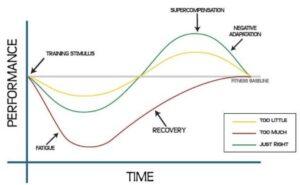 Super compensation
Super compensation
Super compensation means that the body will recover above its original fitness and energy level during the recovery after training. Our bodies are really super smart! We don’t get more energy from the exercises themselves, in fact, we get more energy from the rest and recovery afterward!
 Training frequency (3/wk) and recovery
Training frequency (3/wk) and recovery
As runners, we must allow our bodies sufficient recovery time to avoid overtraining and optimize their energy balance. If you exercise 3 times a week with 36-48 in between each session, you’ll have an ideal balance between exercise and relaxation. This way your body can build up energy and fitness. If you really wish to add more days of exercise, then – instead of running- you could add some runners’ yoga exercises for more flexibility or do some strengthening exercises.
 Insufficient recovery
Insufficient recovery
Avid runners often tend to train too frequently. Some even almost every day. Suppose they start running when their recovery is not yet at its peak. Then the performance capacity drops again during training. Instead of building up stamina and energy, they break it down, resulting in overtraining. People with a lot of mental stress are extra sensitive to this because their bodies need even more recovery time.
In the graph below, you can see how the energy levels and physical shape of an athlete change over time during workouts and recoveries.
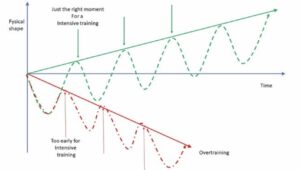
The green wavy line shows the performance of that athlete if he takes sufficient rest and recovery after his workout. He reproduces a little more energy than he had before. His physical shape will improve after each cycle of training and recovery.
The red line shows an athlete that started the next training too quickly. His recovery time was too short and his energy hasn’t recovered completed. If he continues training too often and too intensively, without enough rest and recovery, this person will be overtraining himself. It will result in a decrease in performance. Injuries are lurking here.
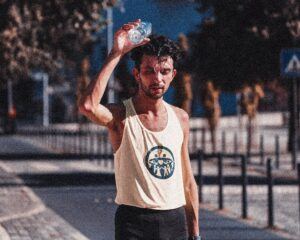 More stress needs more recovery
More stress needs more recovery
Generally, an average of a day of rest in between two training sessions should be OK to recover. But of course, your body needs more time to recover after a marathon than after a low-impact workout. High summer temperatures, mountain running, strong wind, intensive sprint training: the higher the physical stress levels of a workout, the more time you’ll need to fully restore your energy levels.
 Mental stress & lack of sleep
Mental stress & lack of sleep
Recovery time is not only related to the physical stress the body had to endure. Also, mental/emotional stress has a huge impact on your recovery. When you’re mentally stressed out all the time, the body is constantly consuming fuels. There is hardly any time for restoring energy levels. And as mental stress often also leads to a lack of sleep which will even have an even worse effect on recovery. Try to find ways to decrease your mental/emotional stress. Try breathing exercises, meditation, or mindfulness. This will promote better sleep too.
 Healthy nutrition
Healthy nutrition
Every runner should have a closer look at their eating habits. Healthy nutrition and proper hydration are crucial! It’s important to fuel your body with the right food and drink enough water.
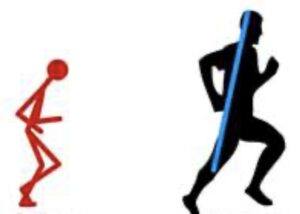 Energy-efficient running form
Energy-efficient running form
During our runs, we do not wish to waste energy. If we look at several runners, we see many different running styles. Body postures, arms movement, foot landings, and step frequency: all have an impact on the amount of energy that’s being used during a run. It’s recommendable to take some lessons from a professional trainer to improve your technique and make your running form more energy-efficient. For some practical tips, read this article: Why running form matters.
 Proper breathing for better energy management
Proper breathing for better energy management
Many people have no clue about their breathing frequency. Breathing is an activity that most of us simply do unconsciously. Until we are running out of breath, for example when we are doing physical exercise. Then we become more aware of it. It’s interesting that our breath is actually a volume button to our bodies to regulate our heart rate. Slower breathing means a lower heart rate, and a lower heart rate relates to less energy consumption. If you’d like to learn more about how to manage your breathing during duration runs, please read this article: “Breathe slower to run longer and feel more energized!”
 Promoting good recovery after exercise
Promoting good recovery after exercise
Your recovery will likely be fine if you meet the following conditions:
- Run 3 times per week for about 50-60 minutes on average.
- Schedule at least one day of rest in between two running days.
- Exercise at varied training intensities.
- Minimize mental and emotional stress.
- Have enough good quality sleep ( recommended 7-8 hours daily).
- Healthy diet
- Breathing properly
 Benefits of balanced training, rest & recovery
Benefits of balanced training, rest & recovery
With a balanced training schedule with enough rest and recovery, your body will have many benefits. Bones, muscles and the immune system will become stronger. If you lead an active lifestyle like this, you will get more energy and feel fitter, which will result in better concentration and focus. Combined with healthy nutrition, it may also promote losing weight and lower blood pressure.
I hope this article inspires you to find the optimal energy balance. Not only to become a better runner but to benefit from it in all aspects of your daily life. Feel the difference! Please share it with other runners and on social media. 😉 Thank you! If you have any questions, please don’t hesitate to contact me at an*******@mo*********.com or leave your comment below.

